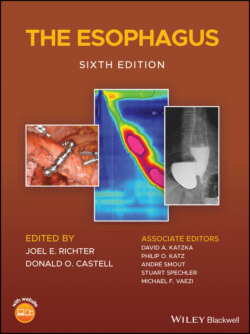Читать книгу The Esophagus - Группа авторов - Страница 48
Cognitive behavioral therapy
ОглавлениеCBT in NCCP has been studied in a variety of settings over the past three decades. One of the earliest studies enrolled 31 patients with NCCP despite negative workup and assigned them to receive CBT focused on teaching patients how to anticipate and control their symptoms or a control group with the assessment of symptoms only. Patients undergoing CBT had significant reductions in chest pain, limitations and disruption in daily life, autonomic symptoms, distress, and psychological morbidity, which were maintained for four to six months of follow‐up [107].
In a similar follow‐up study, consecutive patients presenting to a cardiology clinic with NCCP despite normal evaluation were given the option to participate in CBT. A total of 37 patients agreed to participate. Improvement in symptoms, mood, and activity was noted at three months (p < 0.05 for each). At six months, however, there were only significant advantages in limitation of activities (p < 0.05)and worry about physical symptoms (p < 0.05) [108].
In 60 patients with NCCP, group psychological treatment was also shown to significantly reduce the number of chest pain episodes (p < 0.01), improve depression and anxiety scores (p < 0.05), and improve disability rating (p < 0.0001) at six months of follow‐up [109]. Similar findings, but with more durability of response, have also been reported. Van Peski‐Oosterbaan et al. randomized 72 patients with NCCP to undergo CBT vs. usual medical care and found CBT resulted in a significant improvement in the frequency and intensity of chest pain (48% vs. 13%) (p = 0.002) at 12 months of follow‐up [110]. Jonsbu et al. randomized 40 patients with NCCP to receive three sessions of CBT and one physical activity session vs. usual care from a practitioner and found CBT resulted in an improvement in fear of bodily sensations (p = 0.008), avoidance of physical activity (p = 0.007), depression (p = 0.02), and various domains of health‐related quality of life (HRQOL) at 3 and 12 months of follow‐up (p = 0.03) [111].
For patients with NCCP and coexistent panic or depressive disorder, randomization to 12 sessions of CBT was superior to treatment as usual in reducing disease severity with the clinical global improvement scale (p < 0.001) [112]. Furthermore, patients with NCCP and heart‐focused anxiety were found to respond to CBT (p = 0.023) but not pharmacologic treatment (p > .05) in a randomized control trial by Spinhoven et al [94].
